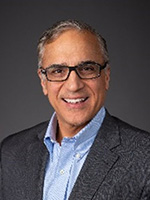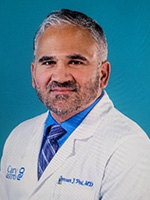As a leading national medical group, we celebrate the work physicians and advanced practice providers do every day to heal patients and care for communities. On National Doctors’ Day, we extend a special, heartfelt thank you to clinicians who are making a meaningful difference in the lives of millions of people.
As a leading national medical group, we celebrate the work physicians and advanced practice providers do every day to heal patients and care for communities. On March 30, National Doctors’ Day, we extend a special, heartfelt thank you to clinicians who are making a meaningful difference in the lives of millions of people. Some of our teammates share what it means to be a clinician.

Tanisha Arora, MD, Emergency Medicine
On how rewarding it is to be a physician
In the emergency department, we often see people on one of the worst days of their lives. I feel so fortunate to have the ability to make their day a little bit better by treating their pain or calming their anxiety.

Ben Courchia, MD, Neonatology
On what it means to care for patients
Working in the neonatal intensive care unit is both challenging and rewarding. The expectations set forth by our patients, their disease processes and the acuity of their condition demand a level of consistent excellence from physicians that can often be intimidating. However, thanks to my residency training at the Mount Sinai Hospital in New York City and my fellowship training at the University of Miami, I have been given the tools to practice neonatology with the sophistication my patients deserve. The opportunity to strive for consistent excellence in care when it is needed most has become a great source of motivation.

Roger Duncan, III, MD, Anesthesiology
On why he started practicing medicine and continues to do so
I wanted to enter the practice of medicine to improve the healthcare of all, on an individual, community and system-wide basis.
Two things bring me great gratification: seeing my patients emerge in the recovery room, comfortable and stable, and secondly, designing and implementing programs that have touched more than 50,000 youth over the last 35 years.

Shawna Gelormino, DO, Emergency Medicine
On the most rewarding part of caring for patients and her work to provide care when and where it’s needed most
It means so much when I see a [former] patient or family member … and they thank me for the difference I’ve been able to make in their lives. Once, when I was working in Texas, I cared for a patient who lived in Hawaii but was visiting family on the mainland when she became ill and ended up hospitalized. I visited her bedside multiple times on the night of her admission and called her family with her to update them as we learned the diagnosis and made plans for how to care for her. Several days later, I stopped by her room when I had a moment to see how she was doing, and her nurses told me that she had been asking for her doctor from Pennsylvania who saved her every day. Because I was a disaster relief physician, they weren’t sure how to find me for her. It was such a heart-warming moment to meet her husband, and he told me how I was able to help them both not to be afraid in such a difficult time. She told me how thankful she was that God had sent me to Texas to be there for her — neither she [nor] I nor the family she was visiting actually lived there.
In the past few years, providing care where and when it’s needed most has truly been the statement I’ve lived my life by. For me, it has literally meant jumping on a flight with sometimes as little as 12 hours of notice and a one-way ticket to an area in need of extra help to provide disaster/crisis relief.

James “Jim” G. Mermigas, CRNA, Anesthesiology
On what it means to care for patients and his advice for those entering medicine
Providing care when and where patients need it most means caring for them while they are going through a potentially stressful time, like surgery. I would advise all medical professionals to not be afraid to get out of your comfort zone and pursue career opportunities in leadership. We are at a critical time in healthcare, and we need the next generation of leaders to move forward and provide care for our patients.

Joshua Newby, DO, Anesthesiology
On why he started practicing medicine
I worked in the operating room in college doing various things, ultimately becoming an anesthesia technician. My initial plan was to become a physical therapist, but after doing some shadowing, I realized it wasn’t enough — I wanted to be more involved in the care. The true event that led me toward becoming a physician involved a multi-trauma car accident right outside our hospital, resulting in the need for immediate cardiothoracic surgical intervention on three patients simultaneously.
I was assigned as the runner for anything those rooms needed and largely was bringing the Massive Transfusion Protocol coolers back and forth, but I also helped the anesthesiologists place lines, transfuse and keep the patient alive so the surgeon could do his job. The immediacy of what the doctors were doing to save the life of a person they knew absolutely nothing about is what drove me into medicine and an operating room-based specialty.

Jeevan Pai, MD, Gastroenterology
On what it means to care for patients and his advice for future medical professionals
There is no other occupation that allows one to directly and positively impact the well-being of humanity. I have always found this extremely compelling. The most rewarding aspect is when I see referrals from my patients who send their children, family members and close friends. I find this extremely gratifying and humbling.
Persevere to always be passionate and genuine in your efforts. Treat each patient as if they are your first and last.

Christopher Scott, MD, Emergency Medicine
On what it means to care for patients and his advice for future medical professionals
Medicine is and was my most notable way of combining my love for science and desire for human contact in a career that would have a notable impact on a person’s experience. My lower school science teacher inspired my medical direction. My medical school mentor introduced me to emergency medicine when she saw I was looking for a specialty with broad impact and a need to cover all disciplines and ages for acute care.

Paul Sherman, MD, Neuroradiology
On his path to becoming a radiologist
I knew that I was fascinated by the practice of medicine at a young age. I was strongest in the sciences in high school and thought studying medicine was a good pathway for being able to make a meaningful contribution to the world. For a brief time after receiving my appointment to the U.S. Air Force Academy, I considered being a pilot, as most teenagers did after seeing “Top Gun.” Ultimately, I chose to attend medical school at the Uniformed Services University.
After my surgical internship, I chose to be a flight surgeon — a primary care physician that takes care of pilots and their families. I had the opportunity to be part of two different squadrons, spending the majority of my time with the 67th Fighter Squadron (F-15 Eagles) at Kadena Air Base, Okinawa, Japan. To this day, I have told my medical students, residents, peers and friends that this was the best job in my entire Air Force career.
After three years, I decided to pursue residency training. I chose radiology and never looked back. I was very passionate about interventional radiology, neuroradiology and neurointerventional radiology. I completed my neuroradiology fellowship at Johns Hopkins Medical Institutions. I focused on education and ultimately became the Program Director of the radiology residency where I trained.

Brian Wilhelmi, MD, Neuroanesthesiology
On a memorable moment caring for patients
Like a lot of anesthesiologists, we remember the emergency care that led to good outcomes. During residency, we were transporting an emergent, postpartum hemorrhage patient through the hallways to the operating room when the bed became jammed in newly installed automatic doors. This required me to pick up the patient and carry her over my shoulder for the last hundred yards to the operating room in order to stop her life-threatening bleeding. She received the right care at the right time, and I next saw her eating Cheerios the following morning.

Silpa Yalamanchili, MD, Gastroenterology and Hepatology
On her advice for future medical professionals
Invest in your relationships with your colleagues, staff, family and friends. There will always be challenging days in your career, but with a good team alongside you, you will be able to navigate these challenges and have fun along the way.